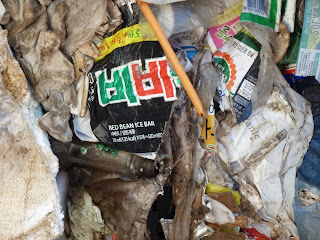Watch Out for Dangerous Reproductive Toxin in Artificial Nails
Girls and women beware:
the glue you are using to put on those pretty artificial fingernails
might contain a banned chemical that is classified as a reproductive toxin.
“False nails may be fun to put on and nice to look at. A word of caution, though: the nail adhesive used to bond the fake nails
may be dangerous to your health,” stated Aileen Lucero, Coordinator, EcoWaste
Coalition, a toxics watchdog.
The group aired this warning after recently bumping into
an assortment of plastic nails, with no market authorization from the Food and
Drugs Administration, at the bargain toy section of Lucky Chinatown Mall in
Divisoria, Manila.
The product comes in 20 small plastic packets with 6 or
12 pieces of decorated nails and a small tube of nail adhesive inside. The product, which is attached to a
cardboard sheet, sells for P50 to P80 per set, or P2.50 to P4 per packet.
While the product information is sparse, the following
chemical ingredients of the nail adhesive are enumerated on the tube
label: acetone, carboxylated vinyl
resins, hexamethylene, methyl ethyl ketone and dibutyl phthalate (DBP).
“The glue’s orange label includes the precautionary
warning ‘keep out of reach of children,’ but the product itself is being sold in
toy stores and often bought with the intent of re-selling to kids,”
observed Lucero.
DBP, classified by the European Chemicals Agency as
“toxic to reproduction,” is banned in cosmetics, as well as in child articles
and toys, under the European Union’s Cosmetics Directive 76/768/EEC and the
Regulation on Registration, Evaluation, Authorization and Restriction of
Chemicals (REACH), respectively. The EU
also considers DBP as “dangerous for the environment” and “very toxic to
aquatic life.”
Citing information from RAPEX, the EU’s rapid alert
system for dangerous non-food products, the EcoWaste Coalition said that the
Czech Republic has banned 36 false nail products imported from China from 2012
to date because the glue contains DBP and duly warned consumers of the risk.
In California, USA, DBP is among the list of chemicals
that is known to the state to cause reproductive or developmental toxicity and
require label warnings, the EcoWaste Coalition further noted.
As per its material safety data sheet (MSDS), DBP is
absorbed by the body through eye or skin contact, ingestion and
inhalation.
Chronic exposure may cause damage to the kidneys, liver
and the central nervous system. It may
further cause adverse reproductive effects and birth defects (teratogenic), and
may also affect genetic material (mutagenic).
The group also expressed concern over the presence of
acetone, another reproductive toxin, in the nail adhesive.
AS per acetone MSDS, the substance is toxic to central
nervous system, and may be toxic to other organs, warning that repeated or
prolonged exposure to acetone can produce target organs damage.
-end-
Reference:
http://www.sciencelab.com/msds.php?msdsId=9927152
http://echa.europa.eu/documents/10162/e321273d-d527-4405-85c3-0bb9fa8927f2
http://www.sciencelab.com/msds.php?msdsId=9927062







Comments
How do you get methyl ketone?
Methyl ketones are often directly prepared from carboxylic acids by reaction with methyllithium. Other simple alkyl ketones may also be prepared in the same fashion, making this a method that should be considered whenever these substrates are required.
Methyl vinyl ketone | Manufacturers | Supplier | Exporter | Spain | France | Europe | Switzerland | Italy | LifeChem Pharma